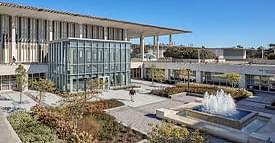Doctor of Philososphy [Ph.D] (Computer Science)
Field of Study:
₹36.8 L/Yr
Tuition Fees
| Year | 1st Year Fees |
|---|---|
| Tuition Fees | ₹3679618 (USD 43102) |
Previous Year Tuition Fees
| Year | 1st Year Fees |
|---|---|
| 2022 | ₹2753183 (USD 32250) |
Doctoral programs are fundamentally different from Bachelor's or Master's degree programs. Like other programs, doctoral students gain a base level of knowledge through course work. The difference, however, comes with research. Whereas a Bachelor's or Master's student may undertake a research project, it merely provides a complement to the course work and is clearly guided by a faculty advisor. Doctoral research is the focus of a doctoral student's studies. Doctoral research is much more self-guided and exploratory than research done in the other programs. Future employers typically select doctoral students on the quality and originality of their thesis research, not their grades in course work. Reflecting this focus, the bulk of time and effort during a student's doctoral studies is spent on thesis research.
In the last thirty-plus years, computer science has developed into a rich academic discipline. But computers and computation also play a key role in many research disciplines, including (but not limited to) engineering, biology, mathematics, physics, chemistry, economics and education. Against such a backdrop, our?interdisciplinary?Ph.D. program produces Computer Science professionals capable of teaching and performing original research at the university level as well as in industrial or other professional settings.
Our faculty in Computer Science are involved in the forefront of research in data mining, distributed systems, and evolutionary & agent-based computing. Our interdisciplinary work cuts across all areas of campus, with current emphasis in bioinformatics, computational imaging, computational engineering, and ecological modeling. Our faculty publish in prestigious journals and conferences in Computer Science, have significant research grants from federal agencies (such as NSF, NIH, DOE, and DOD), and serve on editorial boards, conference committees, National Science Foundation review panels, and leading professional societies.
Computer Science students from University of Vermont are expected to include courses from beyond the traditional realm of computer science. Students are encouraged to consider research topics that combine computer science with other disciplines. The Department has a broad range of secondary faculty appointments with primary interests in other fields who may be used as a student's thesis advisor. Many other faculty at the University have a research interest that includes computer science or computation; these faculty can serve as a co-advisor to a student (see degree requirements, below).
TOP Scholarships
| Scholarship name | Award amount | Eligibility |
|---|---|---|
| - | - | - |
| - | - | - |
| - | - | - |
Key Resources for Your Study Abroad Journey
Scholarship Grants & Financial Aids
| Name | Scholarship Per Student | Level of Study | Type | |
|---|---|---|---|---|
| QS scholarships | Scholarship per studentVariable Amount | Level Of StudyBachelor | TypeMerit-Based | |
| Richard A. Freund International Scholarship | Scholarship per student₹ 4.3 L/Yr$5,000 | Level Of StudyDoctorate | TypeMerit-Based | |
| SWE Scholarships | Scholarship per studentVariable Amount | Level Of StudyBachelor | TypeMerit-Based | |
| The Google Lime Scholarship | Scholarship per student₹ 8.5 L/Yr$10,000 | Level Of StudyBachelor | TypeMerit-Based | |
| Young Women in Public Affairs Award | Scholarship per student₹ 3.4 L/Yr$4,000 | Level Of StudyBachelor | TypeMerit-Based | |
| Young Professionals Program | Scholarship per studentVariable Amount | Level Of StudyDoctorate | TypeMerit-Based |
Similar Colleges


University at Albany


Northern State University


Abilene Christian University
.jpeg?h=143&mode=stretch)

Ohio Northern University


University of South Carolina


University of Akron


State University of New York Polytechnic Institute


University of New Mexico




.png?h=90&w=90&mode=stretch)

1546425900.png?h=48&w=101&mode=stretch)







.png?h=40&w=40&mode=stretch)











Comments